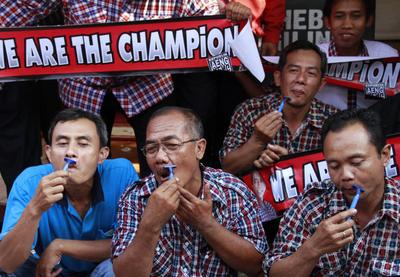Official results will not be available until 1 October, but according to exit polls taken on 20 September 2012, Jokowi gained approximately 53–54 per cent of the votes while Foke obtained 46 per cent.
Jokowi’s running mate, Basuki Tjahaja Purnama (known as ‘Ahok’), is a Christian with an ethnic-Chinese background. In the lead up to the final round of the election, several Muslim figures beseeched their constituents not to vote for a non-Muslim candidate, a clear message for voters to back away from the Jokowi–Ahok team. Seeing the increase in intolerance in Jakarta (and Indonesia as a whole), many Jakartans, including Jokowi’s supporters, reacted by calling for people to be rational and to elect candidates based on their performance. Many utilised social-media platforms — Jakarta having recently been named the most active Twitter city in the world — to convey their messages of tolerance. This seems to have paid dividends for Jokowi.
The results may have interesting implications for the approaching 2014 legislative and presidential elections. Jokowi was supported by the Indonesian Democratic Party of Struggle (the party of former President Megawati Sukarnoputri) and Gerindra (the party of former Suharto-era strongman and 2014 presidential frontrunner Prabowo Subianto). Foke was backed by the Democratic Party (the largest party in the parliament and the party of President Susilo Bambang Yudhoyono) and Golkar (the party of the former dictator Suharto). Such a shift in party support could foreshadow political change at the national level.
The key topics of debate during the campaign, however, related to challenges facing the megacity of Jakarta.
Jakarta has constantly struggled to find a balance between promoting development and providing a safe, healthy environment for its inhabitants. The city’s infrastructure has not kept up with its fast-growing population and high level of density. The state of the city’s poor infrastructure is hugely challenging for Jakartans.
Seasonal flooding is a serious problem, as Jakarta lacks the physical capacity to absorb high rainfall. Regular fire incidents in Jakarta have been associated with densely populated areas across the city and the mismanagement of urban slums and poverty — officials claim such incidents are mainly the result of illegal power connections. But the biggest topic of debate is the heavy traffic congestion; Jakarta’s traffic crisis is estimated to cost at least US$1.4 billion a year. A dramatic increase in multiple-vehicle ownership in Jakarta has not only led to traffic jams, but also to an increase in air pollution, which leads to high levels of respiratory and other serious diseases.
The outgoing governor has made efforts to address this issue, for instance, by pushing for special bus lines and a program for mass rapid-transport systems. Last year, the central government disbursed US$32.4 million in efforts to boost infrastructure development in and around the capital, partly aimed at improving transport infrastructure. But, according to many critics, these investments still fell far short of the Jakartan people’s expectations. Slow implementation and weak governance and law enforcement, as well as limited incentives and disincentives for the public to change their behaviour, have created major obstacles for the city government to overcome this issue.
The challenge of flooding is a similar story. While the outgoing governor and city administration claim to have been successful in addressing the issue, in particular by building the East Flood Canal, many point to the need for more comprehensive solutions.
Solutions for traffic jams and flooding, as well as many other issues, require changes in the behaviour of Jakartans (for example, flooding would be easier to address if people stopped throwing rubbish directly into rivers and drains). Jakartans need to realise that they contribute to the city’s problems, and their behaviour therefore needs to change if they are to be part of the solution. Regardless of any programs put in place by the city government, without active public participation, the desired outcomes will be hard to achieve.
Jokowi claims to have the appropriate solutions for Jakarta’s problems, drawing on his experience as the mayor of the Central Javan city of Surakarta (or Solo). As the mayor of Surakarta, and a nominee for the World Mayor 2012 awards, Jokowi has a reputation as a clean and down-to-earth leader. He demonstrated these characteristics in his previous role through his reluctance to draw a salary, the implementation of one-day processing for ID cards, and improvements to the informal sector and markets.
Jokowi’s critics argue that the challenge of running Jakarta is on a different level to the challenge of running Surakarta, the population of which is little more than half a million. But he and his running mate have a great opportunity to change Jakarta. The numbers show that the majority of Jakartans support the newly elected governor and vice governor. Their biggest challenge is to engage with all Jakartans, to encourage them to be part of the solution and to prove that they are the right leaders to run this megacity.
Fitrian Ardiansyah is a PhD candidate at the Australian National University, and the recipient of Australian Leadership Award and Allison Sudradjat Award.

